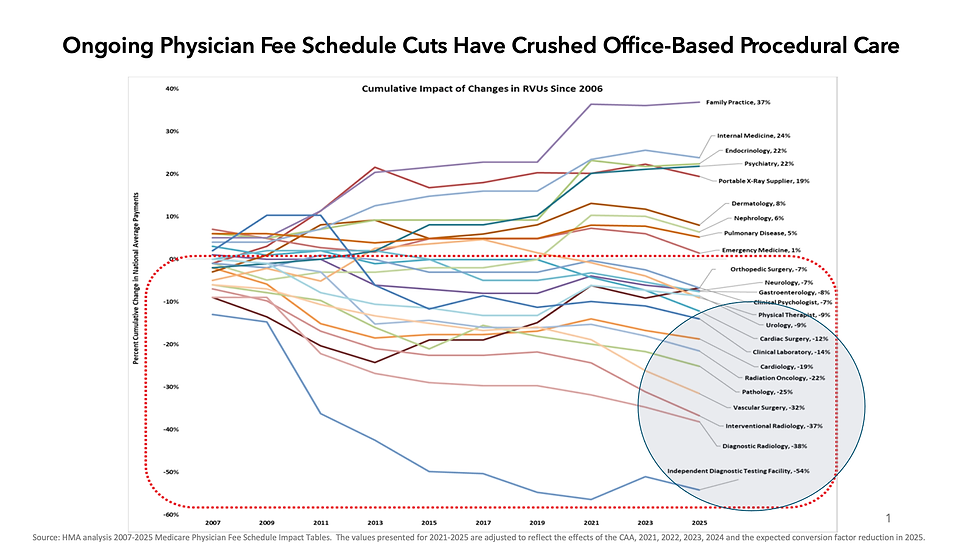
The Issue
Devastating Cuts
For many office-based interventionists – most notably, the healthcare providers in the red box below – cuts under the Medicare Physician Fee Schedule between 2006 and 2025 have been untenable.
Cuts to office-based interventionalists have been so severe that, in 2025, there were 300 office-based procedures across service lines that were paid at rates less than the direct costs associated with those procedures – as calculated by CMS itself. In other words, for 300 services, CMS did not pay clinicians in private practice enough to cover the direct expenses of those services before even considering other costs like physician work and indirect costs (see chart below).
It is important to underscore that all of these services are procedures performed outside of the hospital in the patient-preferred, community-based setting and that these services typically are the lowest cost option available to Medicare beneficiaries. Most of these services also utilize high-technology, high-cost supplies and equipment, the reimbursement for which under the PFS has been significantly eroded by the “direct cost adjustment” since 2006. In other words, from 2006 to 2025, under the PFS, the immediate discount off total direct costs had increased from 33 percent to 56 percent. When indirect costs (i.e. overhead) and physician work are included in the total cost of care, the number of office-based services under the PFS for which reimbursement is less than costs is significantly higher than 300.
In 2025, Medicare Physician Payments Failed to Cover Direct Costs for 300+ Office-Based Services

This underfunding by the Medicare PFS of critical office-based services is a key catalyst for the growing site-of-service differentials between the hospital outpatient and office-based setting (see chart below). In 2019, the average payment for these same 300 codes reimbursed 43% more when performed in an outpatient hospital setting compared to an office setting. By 2025, this disparity had ballooned to 124% on average. As reimbursements for high-technology procedures decrease in the office setting, the same services provided in the hospital show significant increases. This dynamic further drives hospital consolidation and reduces the number of specialists in lower cost settings.
According to new data published by the America Medical Association, “In 2024, 42.2 percent of physicians were in private practice, that is, a practice that was wholly-owned by physicians. This is 18 percentage points lower than in 2012, the earliest year for which comparable data are available. The data suggest that inadequate payment rates, costly resources, and burdensome regulatory and administrative requirements are longstanding and important drivers of this change.”
The AMA report shows that the trend of physicians leaving private practice to join hospital-owned or private equity-backed medical groups continues to accelerate. According to physicians surveyed, this shift is primarily driven by persistent challenges including insufficient reimbursement rates, expensive operational costs, and overwhelming regulatory and administrative burdens that have plagued independent practices for years.
Office-Based Center Closures Are Correlated with Health System Consolidation

Post, Brady PhD et al., Hospital-physician integration and Medicare’s site-based outpatient payments, Health Serv Res. 2021; 56:7-15



Taking Action

Our Mission
OBFA’s vision is for a Physician Fee Schedule that provides payment stability for office-based specialists and fundamental reform of the so-called "budget-neutrality" provision.

Newsroom
Find the latest news, Congressional letters, policy correspondence, press releases, polling, and other important information.
Join OBFA
OBFA is gearing up for action on multiple fronts. If you think your organization would like to contribute towards this important effort, contact us here so we can learn more about each other.

